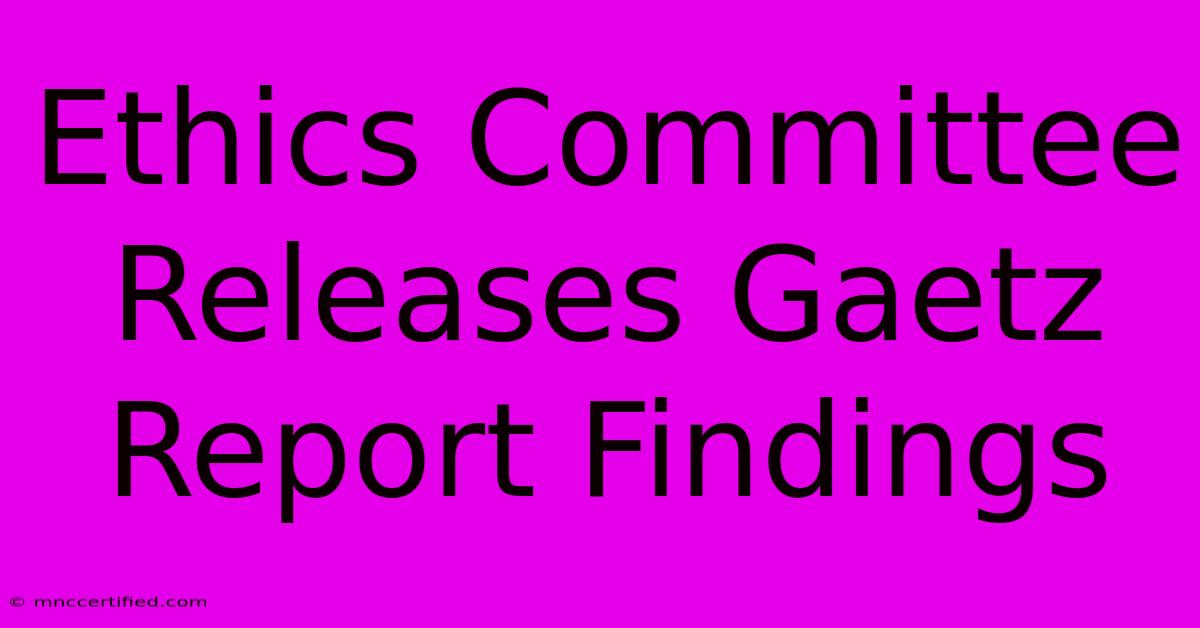Ethics Committee Releases Gaetz Report Findings

Table of Contents
Ethics Committee Releases Gaetz Report Findings: Key Takeaways and Analysis
The House Ethics Committee has finally released its report on Representative Matt Gaetz, concluding a long and highly publicized investigation. This article will delve into the key findings, analyze their implications, and explore the broader context surrounding this controversial case. We'll examine the report's conclusions, potential legal ramifications, and the political fallout expected in the coming weeks and months.
Key Findings of the Gaetz Report: A Summary
The report, while not publicly available in its entirety (due to the nature of some sensitive information involved), has revealed several key findings. These findings, according to various news outlets and official statements, include (but are not limited to):
-
Allegations of Misconduct: The report details allegations of inappropriate behavior by Rep. Gaetz, involving potential violations of House rules and potentially federal laws. Specific details remain limited due to ongoing privacy considerations and the confidential nature of some evidence. However, press releases suggest a range of accusations, from misuse of funds to possible ethical breaches concerning interactions with lobbyists and constituents.
-
Lack of Sufficient Evidence: While the committee found evidence suggesting misconduct, it ultimately concluded that there wasn't enough evidence to warrant further disciplinary action under House rules. This crucial distinction highlights the limitations of the committee's power, particularly in the context of potential criminal investigations.
-
Recommendations for Future Action: Despite the lack of sufficient evidence for internal disciplinary action, the report includes recommendations for improvements in House ethics procedures and oversight mechanisms. These recommendations aim to address loopholes exploited or potential weaknesses exposed by the Gaetz investigation.
The Significance of "Sufficient Evidence"
The phrasing "sufficient evidence" is critical here. It implies that the committee found some evidence of wrongdoing, but not enough to meet the high burden of proof required for formal sanctions within the House of Representatives. This doesn't necessarily exonerate Gaetz, and it leaves open the possibility of further investigations by other bodies.
Political Ramifications and Public Reaction
The release of the report is undoubtedly a politically charged event. The findings, even without leading to immediate expulsion or punishment within the House, will likely impact Gaetz's political career and influence the dynamics within the Republican party.
-
Impact on Gaetz's Future: While Gaetz remains a member of Congress, the report's findings will likely damage his reputation and potentially hinder his ability to advance within the party or run for future office. The lingering cloud of allegations, even if not formally substantiated within the House, could significantly impact his political viability.
-
Public Perception: Public reaction to the report will be diverse and dependent on individual political affiliations. However, the release itself will undoubtedly reignite public debate about ethics in politics and the effectiveness of congressional oversight.
-
Potential for Further Investigations: The Justice Department and other investigative bodies may still be reviewing the evidence gathered during the House investigation, leaving open the possibility of future criminal charges or civil lawsuits against Rep. Gaetz.
The Importance of Transparency and Accountability
The Gaetz case underscores the ongoing struggle for transparency and accountability in government. The release of the report, while incomplete in certain aspects, represents a move toward increased transparency, albeit a carefully measured one. Future efforts should focus on refining internal investigative procedures to ensure a more thorough and efficient process for dealing with allegations of misconduct.
Conclusion: A Continuing Story
The release of the Ethics Committee report on Representative Matt Gaetz marks a significant, yet not necessarily conclusive, chapter in this ongoing story. The findings, the political repercussions, and the potential for future investigations ensure that this case will remain a subject of public scrutiny and debate for the foreseeable future. The need for robust ethics standards and transparent investigative processes within the House remains paramount. The conversation surrounding ethics reform will undoubtedly continue in the wake of this report's release.

Thank you for visiting our website wich cover about Ethics Committee Releases Gaetz Report Findings. We hope the information provided has been useful to you. Feel free to contact us if you have any questions or need further assistance. See you next time and dont miss to bookmark.
Featured Posts
-
Bird Flu In Bossier Parish Louisiana
Dec 19, 2024
-
Bobbi Althoff Cedric Dating Rumors Addressed
Dec 19, 2024
-
Efl Cup Howe Previews Newcastle Brentford Clash
Dec 19, 2024
-
Trump Nominates Walker Bahamas Ambassador
Dec 19, 2024
-
Adidas Lillard Sign Lifetime Deal
Dec 19, 2024